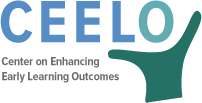This webinar introduces the audience to new Early Childhood Indistar® Indicators developed by CEELO in collaboration with the Center on Innovations (CIL) in Learning. Indistar® is a web-based system for use with district and/or school improvement teams to inform, coach, sustain, track, and report improvement activities. The new early childhood indicators provide an opportunity for stakeholders to use indicators and the associated research to align early childhood education with school improvement efforts.
High quality early learning programs promote the developmental and academic success of young children birth through third grade. Research points to key factors that influence child outcomes, including the professional expertise of the adults, the rigor of curriculum based standards, the involvement of families, and the attention to the social-emotional and physical health needs of children. A preponderance of evidence has emerged on the effects of well-implemented early learning programs to inform state and local decision-makers.
Markers of Structural and Process Quality and Child Outcomes in Multiple Preschool Settings
This presentation provides context on how young children and early programs are faring, highlights disparities and discusses what recent studies tell us. It also explores communicating metrics with educators & policy leaders. Tom Schultz gave this presentation at the Head Start 12th Research Conference.
Definitions and Approaches to Measuring Reading Proficiency
This resource reviews selected resources on national and state definitions of literacy and reading to inform a state definition of reading proficiency. This information can be helpful to guide efforts to ensure all children are supported in developmentally appropriate literacy and reading skills. The resource identifies national and state approaches to measuring reading proficiency.
Excellence for Every Child: Improving the Quality of Teaching Birth through Grade Three
This roundtable offers helpful resources on improving instructional practices from the 2014 CEELO Roundtable (see “presentations” and “resources” tabs). Roundtable Reflections 2014 provides broad highlights from the sessions and lists resources identified by participants.
Early Learning Chiropractory: Can we Make Standards Alignment a Little Less Painful?
This presentation examines how states are approaching a comprehensive early learning system of standards and explores emerging tools to move state standards along a cohesive and high-quality continuum. CEELO’s Jana Martella and Tom Schultz, along with Albert Wat (National Governors Association) and Jim Lesko (ELC-TA) at the 2014 NAEYC Professional Development Institute.
Kindergarten Entry Assessments: Helping Teachers and State Policy Leaders Improve Learning Opportunities and Outcomes for Young Children
This presentation discusses opportunities and implementation challenges in states and features presentations from Arizona, Iowa, Missouri, and Nevada on the implementation of KEA in each state. These presentations were given by CEELO’s Tom Schultz and representatives from states at the 2014 NAEYC Professional Development Institute.
Access to High Quality Early Care and Education: Readiness and Opportunity Gaps in America
This policy report describes readiness and opportunity gaps in access to high quality early education. The report is organized into four main sections. The first describes the “readiness gaps” at kindergarten entry as of 2010. The remaining sections examine the extent to which there are “opportunity gaps” in the early care and education services that may be associated with those readiness gaps.
Formative Assessment: Guidance for Early Childhood Policymakers
This report serves as a guide and framework to early childhood policymakers considering formative assessment, outlining issues for consideration in implementing formative assessment.This guide provides a practical roadmap for decision-makers by offering several key questions to consider in the process of selecting, supporting, and using data to inform and improve instruction.
Evidence of Effective Early Numeracy Models
This document reviews key research that exists on effective early numeral models and provides available resources that can be used to support districts’ use of evidence-based models and approaches.
State of the States Policy Snapshot: State Early Childhood Assessment Policies
This policy brief addresses the questions: What child assessments are required of pre-K and Kindergarten providers? How are child assessment data used? The brief is based primarily on secondary analysis of data collected in the NIEER State of Preschool Yearbook and presents a snapshot of responses to questions about child assessment.
Evidence of Effective Early Literacy Models
This document reviews key research that exists on effective early literacy models, provides an explanation of what early literacy development looks like, describes how teachers can best support children’s acquisition of these skills, and identifies specific interventions that have shown positive evidence.
Equity and Excellence: African-American Children’s Access to Quality Preschool
This report discusses the lack of access to high-quality early childhood education experiences for African-American children and offers recommendations to expand opportunities. The report was released by the National Institute for Early Education Research (NIEER), the Center on Enhancing Early Learning Outcomes (CEELO), and White House Initiative on Educational Excellence for African-Americans (WHIEEAA).
